#trope analysis
Text
Both Pride & Prejudice and Much Ado About Nothing work so well as enemies to lovers because despite surface animosity, it's clear that both end couples really respect each other and for good reasons. I think you could even argue that with Beatrice, she spars with Benedick because she considers him a worthy opponent.
When Hero and Ursuala plot to make Beatrice fall in love, Hero instructs her to speak of Benedick and "praise him more than ever man did merit" and yet when Beatrice finally speaks, she doesn't disagree with their high praise, she says of Benedick:
For others say thou dost deserve, and I
Believe it better than reportingly.
Benedick likewise after his eavesdropping on Don Pedro, Leonato, and Claudio's praise Beatrice says:
They say the lady is fair; 'tis a
truth, I can bear them witness; and virtuous; 'tis
so, I cannot reprove it; and wise, but for loving
me; by my troth, it is no addition to her wit, nor
no great argument of her folly, for I will be
horribly in love with her.
Similarly in Pride & Prejudice, once the misunderstanding about Wickham is cleared away, Elizabeth is able to acknowledge to herself how much she respects and likes Darcy:
She began now to comprehend that he was exactly the man who, in disposition and talents, would most suit her. His understanding and temper, though unlike her own, would have answered all her wishes. It was an union that must have been to the advantage of both: by her ease and liveliness, his mind might have been softened, his manners improved; and from his judgment, information, and knowledge of the world, she must have received benefit of greater importance.
Darcy also finds that he admires Elizabeth, after initially dismissing her:
But no sooner had he made it clear to himself and his friends that she had hardly a good feature in her face, than he began to find it was rendered uncommonly intelligent by the beautiful expression of her dark eyes. To this discovery succeeded some others equally mortifying. Though he had detected with a critical eye more than one failure of perfect symmetry in her form, he was forced to acknowledge her figure to be light and pleasing; and in spite of his asserting that her manners were not those of the fashionable world, he was caught by their easy playfulness.
All of these characters also hear and accept criticism of themselves. Both Benedick and Beatrice hear they are too proud to accept love, which they both overcome. Elizabeth learns that she judged Darcy without sufficient information and Darcy that his behaviour was not that of a gentleman. Their mutual acceptance of this criticism and their growth as people leads to their ultimate happiness.
Unfortunately, those who reproduce this trope often forget to build this foundation of respect and the acknowledgement, either personally or publically, that the characters have been wrong. Instead we get characters who mid argument begin ripping each other's clothes off. No growth, no understanding how they have been wrong, it just becomes "thin line between hatred and love" instead of "we grew towards each other".
#enemies to lovers done right#enemies to lovers trope#trope analysis#pride and prejudice#much ado about nothing#much ado about nothing day#growing towards each other#obviously the character growth is almost instant in Much Ado#but that's just a time factor#a lot more room in a novel#shakespeare#benedick#beatrice#elizabeth bennet#mr. darcy#fitzwilliam darcy
852 notes
·
View notes
Text
Archetype Exploration: Perfect Soldiers
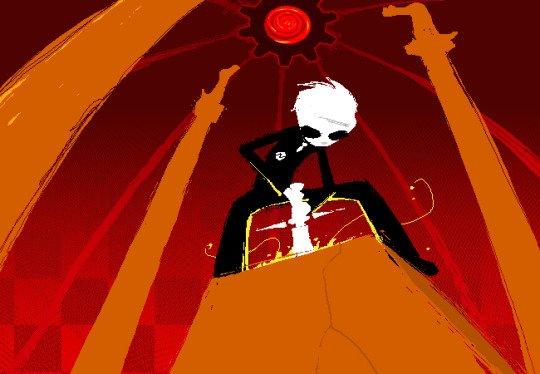
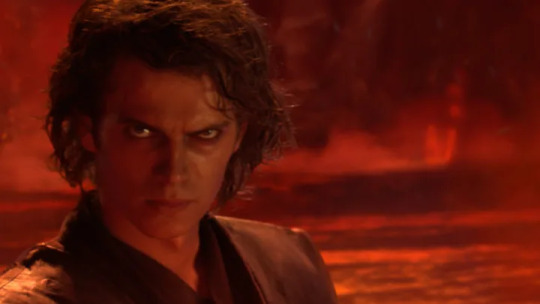
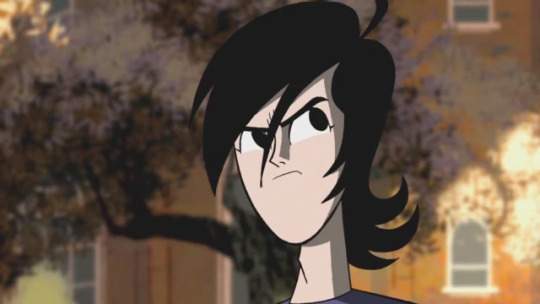
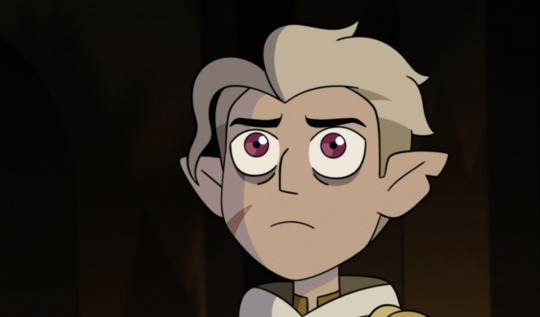
(Hey, please look at this blog's pinned post before reading this post; it gives a lot of context for the lens I'm looking at these characters through, k thx. also, shoutout to @finalgirl-nihilbliss for guessing the archetype)
CW: Abuse, Projection, Surface-Level Media Analysis
If your comfort character exhibits any of the following symptoms:
constant brooding
face frozen in a perpetual scowl
possession of a "dark past" they don't like to talk about
frequent blank stares into the middle distance
constantly trains for something uncertain
You may have just found yourself in the presence of a Perfect Soldier.
Perfect soldiers are characters who were groomed, often from birth, for the sole purpose of inflicting harm on their fellow man. These characters are efficient, tactically-minded, and above all else, violent. Perfect soldiers will often excel at combat and strategy, but struggle with emotional sensitivity.
Note that just because these characters are violent and closed off now doesn't mean that this is their natural temperament. Often, perfect soldiers have some kind of natural compassion that was stomped out through years of abuse training. This can come in the form of a sole loved one who tragically died, but more often than not, it simply manifests as a soft side sanded away.
If the Perfect Soldier doesn't start that way, who is to blame for their transformation? In sci-fi and fantasy, this transformation is usually caused by a morally corrupt institution built to churn out perfect soldiers (the Jedi Academy, the Galalunan Military Academy, the Space Marine Legions, etc.). Other times, perfect soldiers are groomed raised by a cruel and abusive father figure (Endeavor, Bro Strider, Belos, etc.). Some settings even blend the two by having an institution with a twisted general (think Shadow Weaver from She-Ra).
Typically, if a perfect soldier has a character arc, it's usually one of healing and letting go of their anger. This almost always contains at least two of these three steps in the order of your choosing:
The perfect soldier leaves the institution of their torment, either by circumstance or by excommunication. Once on the outside, they'll typically find that their raw might is irrelevant to their survival, and they'll instead need to rely on their lacking social skills. This exit from the comfort zone will prompt the soldier to learn a lot of people skills, typically leading to a "softening up" of sorts. Note that this doesn't have to be a literal escape from a physical place. Rather, it could just be a character being outside their guardian's zone of influence.
The perfect soldier discovers some imperfection with their guardian/institution. Perhaps there's some kind of inconsistency in its moral values. Other times, the soldier finds a secret the guardian/institution has been covering up. Whatever it is, this will prompt the soldier to question their leaders' infallibility.
The perfect soldier meets a person who shows concern for them in spite of the soldier's outward hostility. This outside party will likely witness or hear about the perfect soldier's tumultuous upbringing and take pity on them. This will likely prompt an attempt to reach out to the soldier, something which may or may not be rejected. Whatever the case, this act compassion will likely stick with the soldier, and prompt them to think about their own worth.
An arc like this usually resolves with a direct confrontation with the abusive mentor(s) who turned them into a weapon of war. If the soldier is a member of the supporting cast, this may come in the form of some heroic self-sacrifice, usually to protect the aforementioned outside party. Alternatively, if the soldier is a protagonist, their confrontation will likely be much more active, and may even be a proper fight. The soldier tends to win this fight either with the power of friendship or compassion but this isn't a strict requirement. If the writers really want to get spicy with it, they might even spare their tormentor, really leaning into the idea of abandoning violence (note that this runs the risk of coming off as a "forgive your abusers" narrative).
Alternatively, the lack of a grand confrontation can be a form of narrative resolution in and of itself. Living well is the best revenge, after all, and showing that our former perfect soldier has moved on to a happier, more peaceful life can be a far stronger statement of growth than a glitzy fight to the death.
(This is the part where I tie this whole thing back into the gimmick of the account. If you just wanted a Trope Talk style summary of the archetype, you've seen all there is to see. Thanks for reading, and don't forget to do your daily clicks.)
Why do you keep submitting this?
So, out of all the characters that I've seen submitted, this is easily the most prolific character archetype. At the time of writing, somewhere between 40-50 characters that have been posted roughly fit this archetype, and that's not including any of the characters I haven't posted yet.
Why do submitters connect this particular trope with trans women so damn much?
Firstly, it's important to consider that in most western fiction, the soldier is an inherently masculine archetype. From the classical epics of the Odyssey and the Iliad, to the superheroes and action stars of modern-day blockbusters, there's a very real conflation between a character's manhood and a character's capacity to do violence. A lot of mainstream military propaganda does the same, suggesting that men who enlist are more "authentically masculine" than those who do. This archetype serves as a critique of that idea; it shows us that this masculine ideal can be, and often is, a soul-crushing experience. In a sense, the idea of transitioning serves as an escape from this image.
Furthermore, it's important to consider what this character arc is actually about: a miserable character discovering that a better life is possible, and making steps to achieve personal peace. Often, these characters are fiercely loyal to the institutions that take advantage of them. These characters are often fine with it because they can't conceive of a better world. Once that's presented to them, that's when they start to leave. Frankly, given that a lot of people still don't end up knowing about trans folks until they're adults, I'm surprised more trans people don't connect to characters like this.
Finally, this arc gets back to the core question at the center of this blog: could transition have saved her? The archetype, in its construction necessitates a level of misery, ergo it implies that the character needs saving. It's no wonder these characters tend to garner a lot of Hurt/Comfort fanfic (Anakin Skywalker alone has more Hurt/Comfort fic than some of my favorite fandoms period). There's an inherent desire for these characters have better lives, and maybe some estrogen could do it.
This is my best guess, anyway. If you have thoughts, feel free to share them.
#archetype exploration#trope analysis#cw abuse#cw projection#cw surface level media analysis#transgender#sorry for taking so long to finish this post#i've been trying to phrase it as delicately as possible
123 notes
·
View notes
Text
Lady Echo: A Character Analysis
Before we dive in, there's something about me you should know. I'm a TV Tropes truther. That site is my Bible. If a piece of media interests me, then you'd better believe I have visited its TV Tropes page.
And because of that, Echo in particular is a character I've been meaning to talk about for a while now, because I get the feeling people tend to overlook what I feel is the true core of her character at the end of season 3.


As you can see, while other tropes go more into detail about her true motivations behind betraying Oropo, that part of her character ends up being reduced to being a Woman Scorned, and while that certainly applies here, I really don't think that's the trope that best encapsulates her character and her decisions at the end of the season.
A Woman Scorned is essentially any woman who has been wronged by the person she loves and seeks revenge or has at least expressed great anger. And it can go from being cheated on by a partner, or simply being rejected by their love interest and not taking it well. And both heroic and villainous characters can be the ones to break her heart. In fact, Arpagone too would be an example of this trope, as even if her feelings for Ruel are still there, most of her actions are motivated by the pain she feels for his decision to choose money over her.

As you can see, this all fits with Echo's actions and feelings at the end of season 3, but it's very general overall. Which is why, in my humble opinion, Echo is a better example of Love Forgives All but Lust.
This trope is essentially a deconstruction of tropes centred around the appeal bad boys have for women. The thing about women falling for bad boys is that those women tend to know they're bad news, and beyond a desire to be the ones to change them, the real reason that interest is born is because they're attracted to the idea of the bad boy being a jerk to everyone, but them. Love Forgives All but Lust is what happens when the woman is rudely awakened from that delusion.
In other words, when they realise not even they are safe from their partner's worst actions. And what is the best way to have a woman feel betrayed to the point of seeking revenge? Unfaithfulness.
Sure, they will forgive their partner if it turns out he's a serial killer, but if he cheats? Then he's the one who's dead.
And example of Love Forgives All but Lust is when the police is trying to get a mafioso's wife/girlfriend to testify against her lover, but she refuses to cooperate... until she discovers her husband/boyfriend has a lover, then she'll do everything to bring him down.
If you think about it, this is essentially what happened between Echo and Oropo after he revealed he only ever "loved" Amalia. Even if Echo is a much more active player in Oropo's machinations than simply being aware of them, having helped him carry over his plans for centuries as his second-in-command.
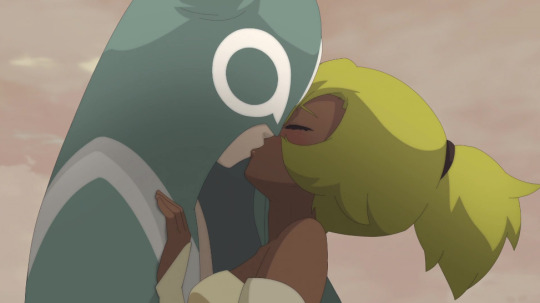
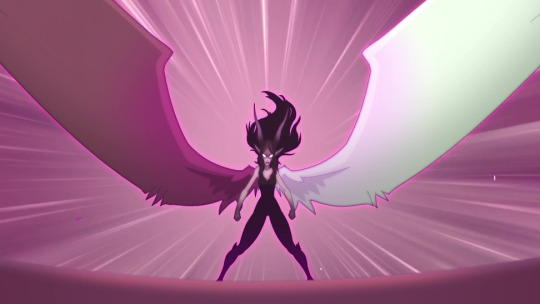
After he kissed Amalia and claimed Echo never meant anything to him compared to her, that's when Echo totally lost it. And her subsequent actions are a direct result of his betrayal. It never had anything to do with Echo seeing the error of her ways, as we all know.
Think about it, it wasn't until Oropo chose Amalia over her, after everything they had ever been through, that Echo truly struck. Once it became apparent her lover didn't care for her nearly as much as she cared for him, that's when Echo revealed his true plans: to destroy the gods, he must destroy the World of Twelve and deprive them of followers. In other words, he was willing to commit mass genocide for the sake of his dream.

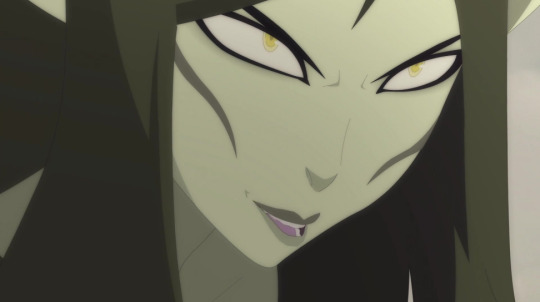

Moreoever, the fact that she got to reveal the true extent of his plans at all already highlights that only she knew about them. All along, Echo knew what Oropo was planning, the consequences of his dreams, and she never once stopped believing in his cause. Their conversation in episode 6 even going as far as explaining Echo already believed in him and supported his dreams before ever falling for him, meaning she can't even excuse her actions by saying her feelings blinded her. Because she was perfectly aware of Oropo's plans all along.
And yet, that didn't stop her from loving him. If anything, it was only another reason she fell in love with him.
No, it wasn't until Oropo broke her heart that she ever went against him.
If you ask me, this all reads as Echo not minding Oropo's most questionable tendencies because she was convinced she was exempt from ever being at the receiving end of his worst actions. After all, she had been by his side the longest, witnessing how he got rid of demigods that failed to meet his standards or were no longer useful (going with what the show claims, I haven't read Ogrest's manga). It wasn't until he kissed Amalia and shoved her aside that Echo realised not even she was safe from him.
And it was because Oropo had had no qualms to screw her over that Echo decided it was her turn to screw him over. And hence, she revealed his plans to the Brotherhood of the Forgotten, not because she'd seen the error of her ways, but because Oropo had hurt her and she wanted to make him bleed in turn.

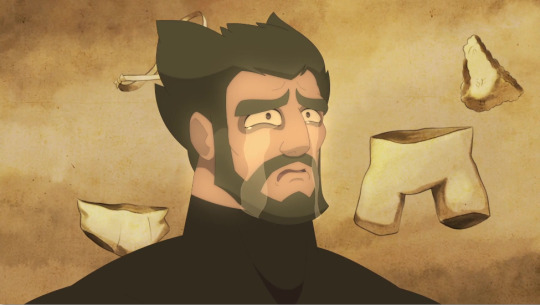
In the end, Echo's actions weren't fuelled solely by revenge or even jealousy, they were fuelled by the bitter realisation that she never meant as much to Oropo as he meant to her. It was about realising he had no qualms hurting her, not about how he had no qualms hurting anyone else.
It was about Echo not being enough for Oropo.
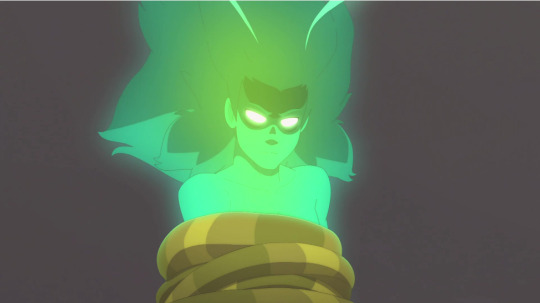
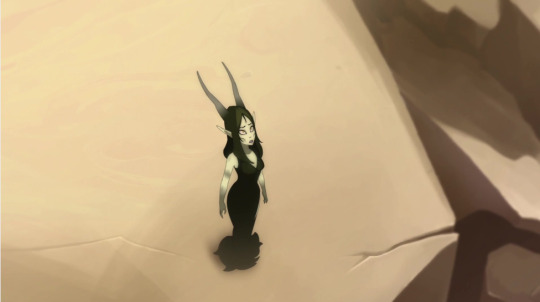
And for me, that's why Echo is a better example of Love Forgives All but Lust.
#wakfu#wakfu spoilers#kinda?#wakfu season 3#lady echo#oropo#the brotherhood of the forgotten#amalia sheran sharm#yugo the eliatrope#demigods#coqueline#count harebourg#toxine#adamaï#black bump#ush galesh#kali#dathura#arpagone#poo#dark vlad#goultard#sipho#love forgive all but lust#woman scorned#wakfu analysis#eliotropes#trope analysis#tv tropes
68 notes
·
View notes
Text
The Reluctant Ruler Trope: A Philosophical Inquiry into Unwanted Power, Responsibility, and the Burden of Leadership

WC: 3,489
Index
Introduction
The Reluctant Ruler in Literature and Folklore
The Existential Dilemma of Unwanted Authority
Political Implications and the Burden of Responsibility
A Special Case or a Universal Relatability?
Closing Words
Introduction
“The world is something that was put into your hands and that you must deal with - so you will. You have a rigid back and steady hands, either metaphorically or physically. Is it nature or nurture? You don't know. You are tired of being steady. You dream of feeling alive. Not that you aren’t, but, sometimes, it’s hard to remember that there is a heart between your ribs.” —“Are You A Soldier, Poet, or A King?” quiz by @atlanticsea
Does anyone here remember the “Soldier, Poet, King” quiz that went around about a year or so ago? When I initially took it, I expected “Poet;” you can imagine my surprise when the “King” result absolutely obliterated my mental health.
As I’ve found, a common theme in my writing is the Reluctant Ruler trope, where either 1) a character is thrust into the role of a savior, hero, or king/queen despite not having any wish to lead people or 2) a character assumes the role of a leader without the full understanding of the morally corrupting demands of the job.
The narrative trope of the Reluctant Ruler has long captivated the human imagination, resonating across cultures and epochs. From mythical tales of kings and queens reluctant to ascend the throne to contemporary narratives of reluctant heroes and leaders, this archetype speaks to fundamental questions about the nature of power, responsibility, and the human condition. But what makes this trope such a tragic and believable character? How do we, as an audience, end up relating to and debating the conflicts and moral dilemmas that these characters face? Today, we embark on a philosophical inquiry into the Reluctant Ruler trope, aiming to uncover its deeper meanings and implications within existential and political philosophical discourse.
The Reluctant Ruler in Literature and Folklore
The archetype of the reluctant ruler is deeply embedded in the narratives of literature and folklore, transcending cultural and historical boundaries. Across diverse traditions, tales abound of individuals thrust into positions of leadership against their will, grappling with the weight of power and the burdens of governance.
Shakespeare’s “Hamlet:” One of the most iconic depictions of the Reluctant Ruler can be found in William Shakespeare's timeless tragedy, “Hamlet.” Prince Hamlet, the melancholic protagonist, is suddenly confronted with the task of avenging his father’s murder and assuming the throne of Denmark. Despite being heir to the throne, Hamlet is plagued by doubt, indecision, and existential angst. His famous soliloquy, “To be, or not to be,” encapsulates the profound existential crisis he faces, torn between the demands of duty and the desire for personal authenticity. Hamlet’s reluctance to embrace his role as king stems not only from fear or cowardice but from a profound skepticism about the legitimacy of authority and the corrupting influence of power.
The Arthurian Legend: In the rich tapestry of Arthurian legend, the motif of the Reluctant Ruler is exemplified in the character of King Arthur himself. According to some versions of the myth, Arthur is initially unaware of his royal lineage and is raised as a commoner by Sir Ector. Upon discovering his true identity and rightful claim to the throne, Arthur reluctantly accepts the mantle of kingship, guided by the wise counsel of Merlin and the moral imperative to uphold justice and chivalry. Despite his noble intentions, Arthur grapples with the burdens of leadership, facing betrayals, challenges to his authority, and the tragic consequences of his own choices. His reluctance to embrace his destiny as king reflects the ambivalence inherent in assuming power and the moral ambiguities of governance.
The Biblical Story of Moses: In the Abrahamic traditions, the narrative of Moses provides another compelling example of the Reluctant Ruler trope. According to the Book of Exodus, Moses is initially an ordinary Israelite that ran from his station as a prince of Egypt, content to live as a shepherd in the wilderness. However, when called upon by God to lead his people out of bondage in Egypt, Moses initially resists, citing his own inadequacies and speech impediment. Despite his reluctance, Moses eventually accepts the divine mandate and becomes the revered leader of the Israelites, guiding them through the trials of the Exodus and delivering the Ten Commandments at Mount Sinai. Moses’s reluctance to assume leadership underscores the theme of human frailty and the transformative power of faith and divine providence.
The Existential Dilemma of Unwanted Authority
Despite not having instances in our lives where we are unexpectedly crowned king or being spoken to by a deity, there are still profound lessons in identity and responsibility that we can pull from these characters.
The Anguish of Freedom and Responsibility
Existentialist philosophers such as Jean-Paul Sartre asserted that “existence precedes essence,” emphasizing the radical freedom and responsibility of human beings to define their own meaning and purpose in a seemingly indifferent universe. For the Reluctant Ruler, this existential freedom becomes a source of anguish and uncertainty. Suddenly endowed with authority and influence, they are confronted with the weight of responsibility and the moral implications of their actions. The existential angst of the reluctant ruler arises from the tension between the desire for autonomy and the demands of duty, as they struggle with the paradox of being simultaneously free and bound by social expectations.
Furthermore, with freedom comes the moral imperative to act responsibly and ethically. The Reluctant Ruler, however, finds themselves burdened with the weight of moral decision-making, as they navigate complex ethical dilemmas and confront the consequences of their actions. Existentialist philosophy emphasizes the inherent responsibility of individuals to create their own moral framework and to confront the ethical implications of their choices with honesty and integrity. The anguish of responsibility lies in the tension between the desire for moral clarity and the recognition of the inherent ambiguity and uncertainty of ethical decision-making. The reluctant ruler must contemplate on the ethical complexities of their role, striving to uphold their moral principles amidst the exigencies of power and governance.
Authenticity and Self-Deception
Central to the existential dilemma of unwanted authority is the quest for authenticity (we already knew this; I wrote two posts on authenticity already that you can check out here and here)—the authentic expression of one’s true self and values in the face of external pressures and expectations. The Reluctant Ruler may experience profound existential alienation as they navigate the demands of their role, questioning whether they are living in accordance with their own genuine desires and beliefs or merely conforming to societal norms and conventions.
In fact, they may be tempted to resort to self-deception—to deceive themselves and others about the true nature of their actions or motivations. Existentialist philosophy warns against the dangers of inauthenticity and self-delusion, highlighting the existential crisis that arises from living inauthentically and betraying one’s own values. The Reluctant Ruler may succumb to the pressures of their position, rationalizing their actions or compromising their principles in order to maintain power or avoid conflict. Self-deception becomes a means of coping with the existential anguish and moral dilemmas inherent in their role, providing a false sense of security and comfort amidst the uncertainties of leadership.
Self-deception ultimately leads to existential alienation—the estrangement from one’s authentic self and the sense of disconnection from the world. The Reluctant Ruler who succumbs to self-deception finds themselves adrift in a sea of moral ambiguity and existential angst, unable to reconcile their actions with their inner convictions.
The Absurdity of Human Existence
“The Absurdity of Human Existence” is a philosophical concept rooted in existentialist thought, particularly articulated by philosophers such as Albert Camus and Jean-Paul Sartre. It posits that human life is inherently absurd, devoid of inherent meaning or purpose, and characterized by the fundamental tension between the human desire for meaning and the indifferent, chaotic nature of the universe.
In assuming positions of power unwillingly, the Reluctant Ruler confronts the absurdity of their situation, grappling with the arbitrary nature of authority and the futility of their efforts to impose order and control upon a chaotic world. The absurdity of leadership lies in the recognition of its inherent limitations and the inevitability of failure and impermanence. Despite their best intentions, the Reluctant Ruler may find themselves overwhelmed by their predicament, struggling to find meaning and significance in a world devoid of ultimate purpose.
Here is where another familiar element of existence comes into play: the illusion of control. The illusion of control is a psychological concept that refers to the tendency of individuals to overestimate their ability to influence or control events, particularly in situations characterized by uncertainty or randomness.
For the Reluctant Ruler, the illusion of control becomes apparent as they assume positions of power unwillingly and attempt to impose order and control upon a world that defies their efforts. Despite their best intentions, they soon come to realize the inherent unpredictability and uncontrollability of the events and circumstances they face. This recognition challenges their preconceived notions of authority and power, revealing the illusory nature of their perceived control.
The Reluctant Ruler may initially believe that they have the ability to shape the course of events and influence outcomes according to their will. However, as they encounter resistance, opposition, and unforeseen challenges, they begin to understand the limitations of their authority and the unpredictable nature of the world they seek to govern. This realization undermines their confidence and exposes the fragility of their sense of control.
Moreover, the illusion of control can lead the Reluctant Ruler to engage in behaviors and strategies aimed at maintaining the illusion of power, even in the face of overwhelming evidence to the contrary. They may resort to authoritarian measures, manipulation, or denial of reality in an attempt to assert their authority and preserve their sense of control. However, these efforts ultimately prove futile, further reinforcing the absurdity of their situation.
The existential implications of the illusion of control lie in its confrontation with the fundamental unpredictability and contingency of human existence. The Reluctant Ruler's quest for control becomes a Sisyphean task, as they strive to impose order upon a world characterized by chaos and uncertainty. In confronting the illusion of control, they are forced to confront the absurdity of their condition and wrestle with the inherent limitations of human agency in the face of existential uncertainty.
Political Implications and the Burden of Leadership
Naturally, we cannot talk about the complexity behind the Reluctant Ruler without diving into those whom they govern. In examining the reluctant ruler trope through the lens of political philosophy, we confront the complex interplay between governance, legitimacy, and the ethical responsibilities of leadership.
Legitimacy and Consent
The concepts of legitimacy and consent are central to theories of political authority, shaping the foundation of governance and the relationship between rulers and the ruled. In the context of the Reluctant Ruler trope, the legitimacy of political authority is called into question, as leaders may assume power unwillingly, without the explicit consent or endorsement of those they govern.
Political theorists have long debated the sources of legitimacy in governance, seeking to identify the basis upon which political authority is justified. Traditionally, legitimacy has been derived from various sources such as divine right, tradition, charisma, or popular consent. However, the assumption of power by a Reluctant Ruler complicates these traditional sources, as their authority may not be grounded in the typical mechanisms of legitimacy. Instead, the legitimacy of the reluctant ruler may be contingent upon factors such as adherence to legal norms, effectiveness in governance, or recognition by key power holders.
In democratic societies, where the principle of popular sovereignty reigns supreme, the consent of the governed is considered foundational to the legitimacy of political authority. Democratic legitimacy is typically understood to derive from the consent of the people, expressed through free and fair elections. However, the Reluctant Ruler challenges this notion, as their assumption of power may not be the result of popular choice or electoral mandate. Or, on the other hand, perhaps it was, indeed, the populace that raised them to their position while they continued to protest and fight against it. This raises questions about the compatibility of their leadership with democratic ideals and the accountability of political institutions to the will of the people.
A Special Case or Universal Relatability?
The Reluctant Ruler archetype, emblematic of individuals thrust into positions of power against their will, serves as a focal point for exploring the intricate interplay between existential realization, political pragmatism, and ethical considerations within the realm of political philosophy and ethical theory. Through the lenses of political philosophers and ethical theorists, such as Niccolò Machiavelli, Hannah Arendt, Immanuel Kant, and Aristotle, we can seek to elucidate the moral spectrum of the Reluctant Ruler, shedding light on the ethical and existential dimensions of their predicament and the broader implications for human nature and governance.
Political Philosophers:
Thinkers such as Niccolò Machiavelli and Hannah Arendt might consider the ethical and political dimensions of the Reluctant Ruler trope. They would examine questions of legitimacy, authority, and the responsibilities of leadership, shedding light on how the Reluctant Ruler’s predicament illuminates broader themes in political philosophy.
Niccolò Machiavelli
Niccolò Machiavelli, a seminal figure in political philosophy, is often associated with political realism, a perspective that emphasizes practical considerations over moral ideals in governance.
Machiavelli’s political realism emphasizes the importance of power dynamics, interests, and strategic calculations in politics. He might argue that the Reluctant Ruler cannot afford to be guided solely by moral principles or existential concerns but must instead prioritize the preservation of authority and the maintenance of order.
For him, the reluctant ruler’s primary concern should be establishing and consolidating their authority, regardless of the circumstances of their ascension to power.
He famously suggests in The Prince that rulers should be prepared to act ruthlessly when necessary, even if it means sacrificing ethical principles.
The ends justify the means in politics, and that the reluctant ruler must be willing to employ any means necessary to achieve their goals.
Ultimately, Machiavelli would likely emphasize the importance of maintaining order and stability as the primary goals of the reluctant ruler. He might argue that the ruler's legitimacy and authority depend on their ability to govern effectively and preserve the social order, even if it requires making difficult decisions or compromises.
Machiavelli might caution against allowing existential angst or moral qualms to undermine the reluctant ruler's ability to govern decisively. He would likely stress the need for pragmatism and flexibility in navigating the complexities of political life.
Hannah Arendt
Hannah Arendt was a prominent political theorist known for her contributions to the understanding of totalitarianism, the nature of power, and the concept of political action.
Arendt would delve into the existential angst experienced by the reluctant ruler, examining how their struggle with assuming power unwillingly reflects broader themes of human existence. She might explore the absurdity of the situation, where individuals find themselves thrust into positions of authority without their consent or desire.
Arendt would likely emphasize the importance of individual conscience in guiding the actions of the reluctant ruler. She might suggest that the ruler's moral integrity is central to their ability to exercise legitimate and effective leadership, even in the face of existential uncertainty.
She might also argue that political action is inherently bound up with questions of ethics and morality, and that the reluctant ruler's existential crisis serves as a catalyst for deeper reflection on the ethical dimensions of governance.
Arendt might caution against sacrificing moral integrity for the sake of pragmatic considerations, suggesting that the Ruler’s adherence to their conscience is ultimately what determines the legitimacy of their leadership.
Ethical Thinkers
Thinkers like Immanuel Kant and Aristotle would likely explore the ethical dilemmas faced by the Reluctant Ruler. They would analyze how the tension between personal ethics and pragmatic considerations shapes the Ruler’s decision-making process, offering insights into human moral psychology and the pursuit of virtuous leadership.
Immanuel Kant
Kant’s deontological ethics emphasizes the importance of moral duty and universal principles in guiding ethical behavior. He would likely analyze the Reluctant Ruler’s predicament by focusing on the categorical imperative, which states that individuals must act according to principles that can be universally applied.
Kant might argue that the Reluctant Ruler faces a moral obligation to uphold certain ethical principles, even if it conflicts with pragmatic considerations. He would emphasize the importance of acting out of a sense of duty and moral integrity, rather than being swayed by expediency or self-interest.
Aristotle
Aristotle’s virtue ethics focuses on the development of moral character and the cultivation of virtuous qualities. He would likely analyze the Reluctant Ruler’s ethical dilemmas by considering how their decisions reflect their moral virtues and character traits.
Aristotle might argue that the reluctant ruler should strive to embody virtues such as courage, wisdom, and justice in their governance. He would emphasize the importance of practical wisdom (phronesis) in navigating the complexities of political life, suggesting that the ruler should aim to achieve eudaimonia, or flourishing, through virtuous leadership.
On Our Nature
Needless to say, not only can we reflect on our own ethical “what-ifs” in parallel to the Reluctant Ruler trope; through this character study, we can unearth a multitude of political and existential debates and still never settle on a universal answer.
The perpetual debates and unanswered questions surrounding the Reluctant Ruler trope speak volumes about human nature and the complexity of individual experiences. At its core, the Reluctant Ruler archetype encapsulates the fundamental tensions between existential realization, ethical responsibility, and political pragmatism, reflecting the intricate interplay of human desires, values, and motivations.
Firstly, the inability to settle on a universal answer regarding the Reluctant Ruler trope underscores the inherent complexity and ambiguity of human existence. Human nature is characterized by its multifaceted makeup, encompassing a diverse range of perspectives, beliefs, and experiences. The reluctance of individuals to embrace leadership roles speaks to our innate desire for autonomy, authenticity, and personal fulfillment, as well as our inherent susceptibility to doubt, uncertainty, and existential angst. The analyses surrounding the Reluctant Ruler trope reflect the diversity of human experiences and the myriad ways in which individuals examine with questions of identity, purpose, and morality.
Moreover, the fact that many individuals can relate to the Reluctant Ruler trope on a personal level speaks to the universality of human struggles and aspirations. Whether it be the fear of assuming responsibility, the desire for authenticity and self-expression, or the ethical dilemmas inherent in leadership, the themes embodied by the Reluctant Ruler resonate with people from all walks of life.
However, the Reluctant Ruler trope also serves as a mirror through which we can reflect on our own ethical convictions, political beliefs, and existential uncertainties. By examining the complexities of this archetype, we are compelled to confront our own values, biases, and assumptions, and to consider how they shape our perceptions of leadership, responsibility, and human nature. The inability to settle on a universal answer regarding the Reluctant Ruler trope challenges us to confront the inherent ambiguity and uncertainty of human existence, prompting us to engage with questions of identity, meaning, and morality in our own lives.
Closing Words
What initially appears as a narrative device in storytelling reveals itself as a mirror reflecting the intricacies of our own ethical frameworks, existential dilemmas, and political realities.
At its essence, the Reluctant Ruler archetype embodies the universal struggle between autonomy and responsibility, authenticity and conformity, freedom and obligation. Yet, beyond the realm of fiction, it prompts us to reflect on our own ethical convictions and existential uncertainties. Are we, too, begrudging in our own lives, navigating the delicate balance between personal desires and societal expectations? Do we confront the existential angst of freedom and responsibility, or do we succumb to the illusion of control and self-deception?
Moreover, the Reluctant Ruler challenges us to examine the legitimacy of political authority and the ethical responsibilities of leadership. In a world where governance is often characterized by power struggles and moral ambiguities, how do we reconcile the demands of pragmatism with the imperatives of justice and integrity? How do we ensure that those in positions of power govern with wisdom, virtue, and compassion?
Ultimately, the Reluctant Ruler trope serves as a catalyst for introspection and dialogue, inviting us to confront the complexity of human nature and the ethical dimensions of governance. As we scrutinize the unresolved questions and perpetual debates surrounding this archetype, we are reminded of the enduring relevance of philosophy in our quest for understanding, meaning, and ethical clarity.
In the end, the Reluctant Ruler challenges us not only to ponder the existential dilemmas of fictional characters but also to confront the ethical complexities of our own lives and societies. It is through this introspective journey that we may gain deeper insights into the nature of leadership, autonomy, and the human condition, and perhaps, find a path towards a more just, compassionate, and authentic world.
#writers on tumblr#writeblr#writers#on writing#creative writing#writer#writing#writers and poets#writerscommunity#novel writing#writing life#writing community#writing inspiration#writing tips#writer stuff#writers of tumblr#writer community#writer problems#writer things#writer on tumblr#writing trope#tropes#character tropes#trope talk#trope analysis#trope prompts#tropes i love#characterization#writing tropes
133 notes
·
View notes
Text
You know what slaps? Every fucking time?
When the villain becomes the hero and the hero becomes the villain.
And not in that bullshit “oh, the good guys were really the bad guys the whole time uwu”. I mean when a real villain, a dark and cruel monster genuinely sees the error of their ways and strives to be better in tandem with a real and true hero sliding down the path of hate and evil and then, one day, they look at each other and realize they’ve swapped places.
Like, it’s the symmetry. The monster becoming human and the human becoming a monster. The villain starting to see clearly, understanding that even if there’s no forgiveness for them they have to rise above what they were and try to be better. Meanwhile the hero deludes themself further and further, isolating and growing bitter with every step until they finally snap and become the very thing they fought against.
It doesn’t get any better than that.
#incorrect super smash bros#writing#trope#trope analysis#idea#thought#ideas#musings#thoughts#musing#writing thought#writing idea#fallen hero#redeemed villain#narrative foil#narrative symmetry#hero#villain#redemption arc#corruption arc#fall from grace#fall from grace arc#it just hits every time
912 notes
·
View notes
Text
I really wonder how those "Adult mind trapped in child bodies" scenarios would work in real life. Even if you carry over all your personality, knowledge, and experience; you're still in a body that's in the process of figuring out how things work.
Despite knowing how to hold a pencil, your body doesn't know how and you have to relearn how to write. You struggle with basic math concepts that you know you know, but your body hasn't learned them yet. You can't form the words and sentences you want because your body doesn't know how to say them. You can't stop yourself from bursting into anger, excitement, or sorrow because your body doesn't know how to control itself.
And then imagine if the body starts to develop its own sense of self and now you have to drag this scared child into whatever thing you need to do.
98 notes
·
View notes
Text
Alicent + the woman in the window: Analysing the trope
“You desire not to be free, but to make a window in the wall of your prison”
— Rhaenys to Alicent, Hotd 1x09
There's a lot going on between Alicent and windows in House of the Dragon:



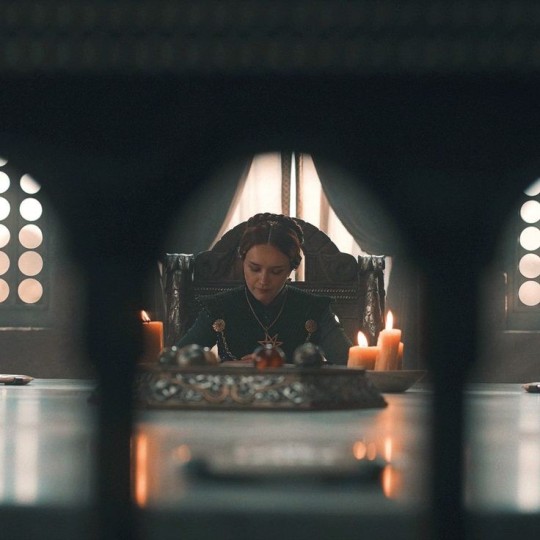
Alicent is a hightower, a woman trapped in a tower looking out the window. Her daughter and granddaughter die by jumping out the window.
For the purpose of this post, I'm limiting myself to analysing the "woman in the window" trope as seen in art.
The woman in the window has has been featured in Mediterranean pottery from the fourth century BCE through Botticelli, Raphael and Rembrandt, Sickert and Picasso.
A window is a border between the inside and the outside, the private and the public, the light and the dark. It provides commentary on cages, frames, prisons, and the limit of the subject's freedoms and horizons.
When a woman is framed in light streaming through a window, we are are seeing her as she was seen by the artist.
Tracy Chevalier noted the presence of a "relentless male gaze" when she visited Reframed: The Woman in the Window, an exhibition at Dulwich Picture gallery.
Between those two poles there are various depictions and judgments of women. Sometimes they’re prostitutes; other times they are the Virgin Mary.
In fact, among the earliest depictions of "a woman in the window" is a Mediterranean vessel depicting a courtesan.
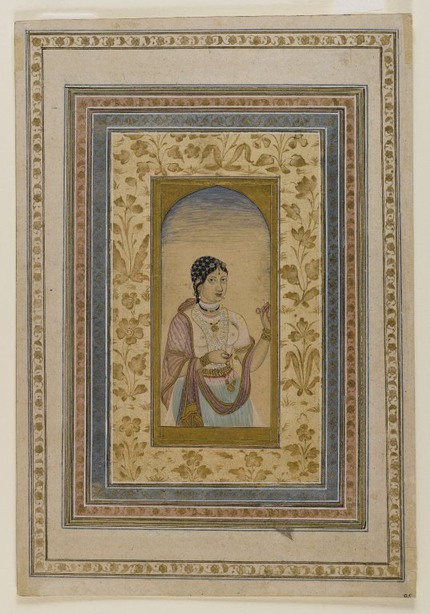

1. Courtesan in a window, 18th century
2. The caption of "Woman at the Window" by Degas reveals that the featured woman is a courtesan he paid to model for him.
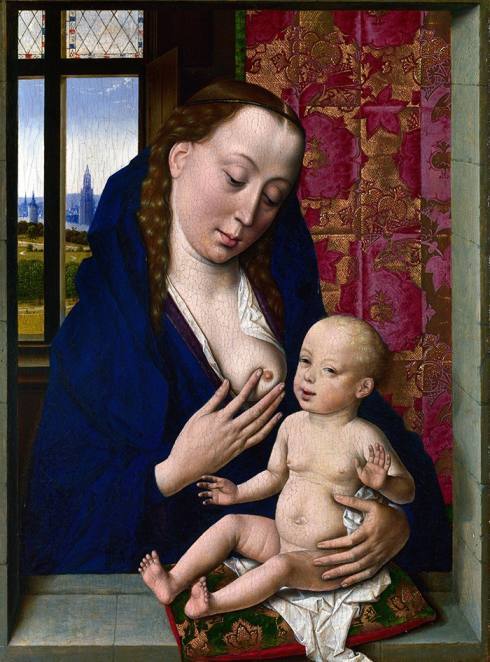
3. The Virgin and the Child, seen by a window
Are women in windows protected by being inside and shutting out the world, or are they being confined against their will?
In one of Picasso's portraits, his partner Francoise Gilot looks out the window, her hands pressed against the glass. Tracy notes that
knowing what we know about Picasso and his partners, it is clear Gilot is trapped inside the male gaze (though she does eventually escape the relationship), her hands semaphoring anxiety.

Windows and Waiting

Windows are also linked to waiting, and this is especially true of women in medieval times, waiting at the window for men to return from war, waiting at the window to learn their own fate.
62 notes
·
View notes
Text
I just realized why I like Tomarry so much lololol
It isn't because of the ship itself, or their dynamic... It's because, in Tomarry fics, I get to see both their povs and understand what drives them so much.
Because on one hand, I get Harry, who's afraid of immortality because he will have to watch everything go on without him. He will have to watch everyone die.
On the other hand, there's Tom, who's afraid of death because he grew up fearing it and not knowing what comes after. Fearing that everything will someday end.
I just find the duality shown in Tomarry fics very fascinating.
21 notes
·
View notes
Text
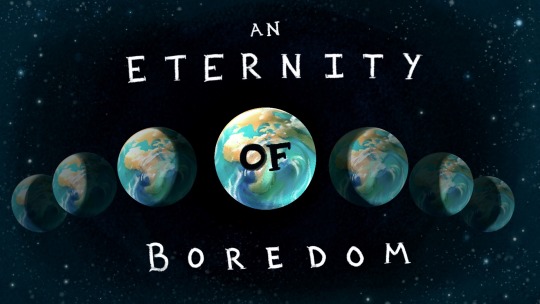
NOW ON NEBULA!
No danger, no death, no place left unexplored or problem left to solve… now what?
#tale foundry#writing community#writing inspiration#writers of tumblr#writers on tumblr#story ideas#utopia#utopian fiction#science fiction#scifi#17776#17776 football#what football will look like in the future#speculative fiction#trope analysis#in a perfect world#niche fandom
13 notes
·
View notes
Text
I love the concept of zombies, but I don’t think zombie movies ever really capture the vibe I’m picturing though. They’re always looked at from a very external perspective. I wrote a short story once about the dead suddenly being resurrected and it focused more on their first moments being alive again. Most of them couldn’t even get out of their graves.
I’m fascinated by the logistics of zombies too. Their muscles are still too dead to let them walk straight. They’ve lost some of their muscle memory so they can’t do things they used to do. Maybe the zombies that have been dead the longest are the most mindless since their brains have been inactive for so long. Maybe that means the more recent undead have more control.
9 notes
·
View notes
Text
Artificially created human/android questioning why their creator gave them the gender that they did, and what that says about their creator's view of gender in society.
Artificially created human/android questioning why their creator was so gung ho about them having a fully formed adult body right out of the incubator instead of letting them grow into it like most people.
Born Sexy Yesterday character lamenting they never had an opportunity to have a childhood because when people look at them, they see an adult in their mid 20s, not a 14-month old.
Born Sexy Yesterday character desperately trying to figure out who are their peers really? They're too immature for adults their physical age, but their language skills are too advanced for children their actual age. They've passed too many development milestones in some areas and too few in others.
Born Sexy Yesterday character wishing they had a baby's body so they would be treated like one.
Born Sexy Yesterday character counting down the days until they're actually 18 because maybe things will make sense when they finally feel like a real adult.
20 notes
·
View notes
Text
Hanahaki is a psychosomatic issue.
The trope states that someone starts coughing up flowers/growing flora in their lungs due to “unrequited love” but this is not the case in most (read: not tragedy) fics.
If love is “unrequited” that means it is not returned. The implication is that not only must the love be understood by the other party, but also rejected or snubbed, i.e. “I only see you as a friend.”
But in most hanahaki fics I’ve read the character afflicted makes the judgement themself. The afflicted ASSUME their love isn’t returned. They don’t tell the person they love their feelings because they already believe it’s impossible or bad or whatever for their beloved to return their feelings.
So, it can be deduced that hanahaki is not caused by unrequited love as it’s so often attributed but by the afflicted’s own personal judgements. The afflicted believes they already know an answer they haven’t actually received. Most often in fics, their feelings would be/are returned if they are expressed to the object of their affection, so the love is most definitely requitted, it just hasn’t been expressed yet.
In conclusion, hanahaki is a mental health illness akin to anxiety and depression with symptoms that physically impact the afflicted’s respiratory health.
Thanks for coming to my Ted Talk.
#hanahaki#trope analysis#it’s not unrequited love on the part of the object of affection#it’s all in the head of the afflicted#that’s the only answer that makes sense
16 notes
·
View notes
Text
Just as somewhat of an add on to my post about the criticized trope of "villain who threatens the status quo" and its many manifestations, and when the framing is actually giving a harmful message and when the nuances of the story make it not so and the objections to it is a "false alarm" - one thing I also notice when people talk about stories' relationship to the status quo within their world is this equation of "natural = immutable" and "manmade = mutable". Like along the lines of "this story is bad because it depicts someone wanting to change a manmade social phenomenon as bad, and they need to accept and find peace instead, when that trope is actually supposed to be used for things like people who want to stop things like natural death or an earthquake". And look, I get why the "treating unnatural things as natural in the narrative" is highlighted as it is by some people, given the long history of social Darwinists and the like justifying their preferred (oppressive) politics and social organization by saying it's about evolution or human nature - they created this association between natural/immutable and manmade/mutable, not people talking about fiction on social media, and people understandably want to defeat these people's arguments on the ground they set because they very much can be defeated on the ground the social Darwinists etc. set.
But... this dichotomy is absolutely not true of real life, and just falls into the naturalistic fallacy. There are lots of natural, bad things that can and have been changed - diseases that have been cured, even the fact that scientists already have plans (and have practiced) the idea of diverting an asteroid before it hits earth and causes massive damage. Every manmade social structure can be changed, but the inverse is not true.
So I feel like instead of having this paradigm for when a story "should" feature the problem in its world being fixed as coming down to whether it is natural or not, it should be based on what would be right for that specific story. There can be good stories about people confronting a disease or natural disaster without being able to "do anything" about it, and good stories about people curing a disease or, like with the asteroid example, preventing a natural disaster. Likewise, there can be good stories about rebelling against an unjust social system, and there can be good stories where that unjust system is effectively a constant that the characters have to deal with, suffer in, and perhaps find happiness or little victories in spite of it. Just because the system can be changed doesn't mean that a given set of characters in the specific situation they are in reasonably could (unless you want to get into a lot of victim-blaming), any more than you would be mad at a story where the characters deal with an epidemic disease for not ending with them all being vaccinated, because you know that is a possibility in the long run, even though those characters in that situation wouldn't feasibly be inventors of vaccines.
Now this comes with a few caveats. First of all, what about the extent to which seeing stories where people don't do anything about the systematic problems they face will encourage people to underestimate their own power to change things? Well, I really don't think the main obstacle to people taking social action in their community is that they sometimes watch fiction where characters don't do that. I feel like people spend more time wondering why a fictional character who is mostly powerless in front of a greater force before them spends time trying to help themselves, their family and friends as best they can rather than figure out some way to destroy the system entirely (again, see the "why didn't they invent a vaccine" example), then actually questioning their assumptions about THEMSLEVES, in the real world, being powerless and how much more they themselves would be really capable of.
And some people might also object along the lines that making things about human interests and small victories can deflect things away from the social issues, like an American news segment that praises a 9 year old for raising money for a parent with cancer through some cutesy sale rather than talking about the problems with the USA's health care system. But here, the criticism isn't that it's wrong to praise the kid for going out of their way to do something so selfless, or treat those individuals who do brave and kind things in a harsh system can only be seen as victims and not also as heroes (yes, a kid like that would absolutely deserve to be praised and admired!). The criticism is that focusing on these stories allows people to subliminally want the bad systems to stay in place, so humans will keep being morally tested and show heartwarming nobility, that they will think the world is a just one because, even though it is unjust, it creates those "nice moments", and that they might believe that people are so kind that there will always be some individual person to carry the load for someone else, so there's no need to change the system, in the process ironically not treating the acts of kindness as extraordinary and heroic enough, in that people are expected to do them and in such quantities that the problem somehow stops existing altogether. And I don't think any of these criticisms really apply when you are talking about fiction, at least fiction depicting completely made up (if based on reality) social injustices and not journalism. You could make an argument for fiction depicting an injustice in the real world featuring someone doing something "heroic in the small scale", but I really don't think in the end there is harm in a fictional story where a person has little power to change the system they are in but still does as much good within it as they can.
So I've talked about stories where the system is depicted as bad, but even though changing it can be done theoretically by people in general, for the character's being followed it's unfeasible and for all intents and purposes it's just something they have to live with and work within, and how that's likely not sending some noxious message on how we should worship the status quo. But what about stories like the ones I alluded to at the beginning, where wanting to change things is villainized, treated as hubris and sign of a mind that doesn't have the inner peace to accept things?
Well, I would say that these stories generally send a "bad" message, but, because natural really isn't the same as immutable, they send a bad message whether the thing the character tries to change is natural or unnatural! So yeah, I don't like stories villainizing the horrible audacity of someone to want to end slavery or something, and I also don't like stories villainizing the horrible audacity of someone, say, wanting to revive the dead, because things are better as nature made it. That's not to say that all stories about hubris and the value of acceptance and equanimity are bad, just that whether they are "problematic" comes down to the framing rather than whether the thing the character wants to change is natural or unnatural. And by framing, I mean this: if the character is framed as hubristic because they believe they, as an individual, are so intelligent and talented that they can change some complex aspect of life for the better without any nuance or carefulness or input from others, that has potential to be a great story, and it's a flaw many people have in real life that has caused no end of suffering in the real world! But if the character is framed as hubristic for believing that anyone could or should change that aspect of life, that it's too complex or more often too inherently good or just "sure it's not moral, but it's natural, so it must be worshipped", then no. Kill that idea with fire.
Likewise a lack of acceptance can work when it's clear it's not saving anyone, it's just hurting by not letting go. Like a "don't revive the dead" story can absolutely work if the equivalent real-world metaphor is someone's family keeping them on life support and using CPR over and over again, even when it's painful and humiliating and it's clear they aren't going to ever get better. That's something horrifying that does happen in the real world! But not so much when the character actually wants to save another person, in a way that will definitively help them if it's done right rather than just harm the other person but make the "reviver" feel better about themselves and escape their own personal grief. And for someone who isn't accepting their own death and is villainized: is the villainization coming from them lashing out and making themselves and others miserable even though there's nothing they can do about it (fine) or for them wanting to save themselves when they legitimately have a change (not fine)! Now it might be that in your fictional world, the way to save or revive yourself or someone else involves hurting or killing other people, in which case they very well might be bad people for it, but again, the key is in the framing; are they portrayed as bad people for causing a greater harm for a smaller good (fine), or portrayed as bad people because wanting to defy nature is not good in the first place, and even if there wasn't all the harm they should just "accept death (or whatever other bad thing there is in question)"?
Now I usually try in my posts on Tumblr to stick out of discussion of politics that is not directly related to media, not because I obsess over media as being the basis of everything but because that's what I come on this site to do, and would go elsewhere to just talk unabated about politics. Though still, I can't help but notice that when you have a debate where side 1 is like "we have to change this horrible thing, and have the imagination to see the possibility and strive for it", side 2 is like "it's more complicated than that, don't act as if you know everything and can fix everything that easily", and side 1 again is like "It's not complicated, that's just the excuse people make for themselves", what groups of people are on either side tends to flip depending on whether the thing to change in question is natural or manmade. If it's natural, it's typically the rationalist techno-optimist groups cheering on change (see all of the support for anti-aging research you see there) and left wing (and some parts of the right wing) people who are skeptical for how it may lead to social inequalities (to which, again, the proponents would argue that the potential for downsides is no reason for the harm by neglect that comes from not trying), while if it is manmade it's left wing people are are arguing strongly for change and the supposedly "open minded" dreamers of the aforementioned rationalist techno-optimist crowd are suddenly saying you shouldn't change anything because it's complicated/perfect as it is. In reality, I think the right attitude for both is trying to open your mind to the possibility of change and be dedicated to trying for it, while maintaining carefulness and skepticism about the effects of it being done "wrong".
2 notes
·
View notes
Text
One of my favorite things to do for fun is watch videos breaking down certain media tropes. And I was watching one about the heart of a group. A poorly written “heart” character can be written with the intention to be lovable but are actually annoying sometimes. A character that is written solely with the purpose of being lovable can be really frustrating, especially if every other character adores the heart when the audience realizes that there’s no real justification for that.
Now let’s see if y’all can guess which characters I’m thinking about that fall into this poor writing category.
#spoiler alert it’s Eddie and Mike#Eddie has some very lovable traits but a) climbing on tables while people are eating b) judging people for their hobbies and#c) refusing to accommodate a friend#are not lovable traits#those are character flaws#also Mike is not the heart of the party#that’s objectively untrue from a writing standpoint#will is the heart#he’s the emotional center of the group#everyone rallies around him when he’s in danger#he’s the one who resolves conflicts#Mike best fits the role of the leader but he’s a poor leader#trope analysis#stranger things writing criticism#red is being an English major again
11 notes
·
View notes
Text
Our Obsession With the Tortured Poet Trope: Where Do We Draw the Line of Responsibility?
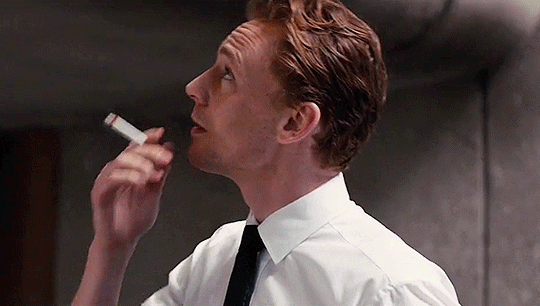
WC: 1592
CW: mentions of su*cide, mental health, and character ab*se
Index
Introduction
The Romanticization of Suffering
Why? Morbid Fascination
However, There's a Trap...
What Does it Mean For Us Writers?
Introduction
The Tortured Poet trope embodies a romanticized image of the artist grappling with internal turmoil and emotional anguish, often portrayed as a misunderstood genius whose suffering gives birth to great works of art. However, alongside this fascination lies a complex web of ethical considerations regarding the portrayal and romanticization of suffering. Today, we will delve into the roots of the Tortured Poet trope, exploring its connection to romanticism, creativity, and the human fascination with suffering. Furthermore, we will seek to examine the ethical responsibilities of promoting this archetype.
The Romanticization of Suffering
The notion of romanticizing suffering can be traced back to ancient Greek mythology, where the Muses, the goddesses of inspiration, were believed to both inspire artists and inflict them with madness. This dual aspect highlights the complex relationship between creativity and suffering. Plato, an ancient Greek philosopher, praised creativity as a form of “divine madness,” suggesting that it was a gift bestowed upon individuals by the gods. Aristotle, another influential philosopher, similarly suggested that great genius often came with a touch of insanity, further reinforcing the idea that creativity and suffering were intertwined.
During the Romantic era, which spanned roughly from the late 18th to the mid-19th century, artists and writers placed a strong emphasis on intense emotions and experiences. They celebrated the beauty and authenticity found in suffering, viewing it as a source of inspiration and creativity rather than something to be avoided or minimized. In this context, the figure of the Tortured Poet emerged as a symbol of the romantic ideal—a creative individual who embraced their inner turmoil and used it to fuel their personal expression.
A notable example can be found in the character of Heathcliff in Wuthering Heights. Firstly, it’s a prevalent trope in even modern literature and film that a “reformed bad boy” suddenly makes the best boyfriend/husband material. Heathcliff, however, does not reform. He holds his grudge and desire for revenge to the point where his abuse of Isabella is one of selfish amusement. Critic Joyce Carol Oates actually argues that Brontë does to readers what Heathcliff does to Isabella: testing us with his violence and morbidity to see how much we will continue to insist that he is a romantic hero. He may not be a poet from an artistic standpoint, but he is one who fully embraced his traumas to fuel his behavior and personality; and he definitely reflects the Romantic era’s fascination with the darker aspects of human experience.
Why? Morbid Fascination
So why is there such an awe surrounding the darker sides of human nature? It seems that morbid fascination is deeply ingrained aspects of our behavior, leading audiences to seek insight into the inner workings of the tortured artist’s mind. This tendency manifests in various forms, from the consumption of the artist's work to the scrutiny of their personal life and struggles.
Audiences are drawn to the darkness and turmoil that often permeate the work of tortured artists. Whether it’s the haunting lyrics of a troubled musician, the raw emotion captured in a painter’s brush strokes, or the visceral honesty of a poet’s words, there is a magnetic allure to the expression of human suffering. This fascination stems from a desire to understand the complexities of the human condition, to confront our own mortality and existential angst through the lens of another’s experiences.
The Nightmare
“The Nightmare” by Henry Fuseli is a prime example of people’s fascination with darkness and the macabre. Painted in 1781, this iconic work of art depicts a woman draped across a bed, seemingly in the throes of a nightmare. Above her, a demonic creature, often interpreted as an incubus, sits perched upon her chest, while a ghostly horse with glowing eyes lurks in the background.
The painting’s unsettling imagery and eerie atmosphere have captivated viewers for centuries, eliciting a sense of unease and fascination with the darker aspects of the human psyche. Fuseli’s masterful use of chiaroscuro and dramatic lighting heightens the sense of foreboding, drawing viewers into the nightmarish scene.
Audiences are drawn to “The Nightmare” not only for its technical brilliance but also for its exploration of themes such as fear, desire, and the subconscious mind. The painting taps into primal fears and fantasies, confronting viewers with the uncanny and the irrational.
Moreover, this painting exemplifies the Romantic fascination with the supernatural and the macabre, prevalent during Fuseli's era. The Romantics sought to explore the darker realms of human experience, rejecting rationalism in favor of emotion and imagination. Fuseli’s painting embodies this fascination with the unknown, inviting viewers to confront their deepest fears and desires.
However, There’s a Trap…
When looking into the Tortured Poet, I couldn’t help but compare it to the Obsessed Artist trope, which I talked about previously. I wondered what the differences between the two were, as both seemed to go to the extremes to express their art and both had some semblance of trauma that permeated their being to the point of potential or evident harm.
My observation was this: where the Obsessed Artist is seemingly unaware of their destruction, the Tortured Poet validates it. There are two sides to this validation: internal and external.
Internal Validation
There is what could be called “self-prescribed torture,” where the Poet will claim they are Tortured in order to validate their actions. In other words, the trope can lead individuals to resonate with the romanticized image of the Tortured Poet, glorifying suffering as a prerequisite for artistic brilliance. This misinterpretation may compel individuals to fabricate or exaggerate their personal struggles, believing that genuine pain is necessary for authenticity.
Take Henry Winter from The Secret History as an example. Despite his privileged upbringing and academic success, Henry is deeply disillusioned with the world around him, harboring a sense of existential ennui and moral ambiguity. He sees himself as an outsider, disconnected from the superficiality and hypocrisy of society, and seeks solace in the pursuit of knowledge and aesthetic beauty.
Despite his intellectual prowess, Henry is not immune to the allure of power and control. As the leader of the group, he exerts a subtle but undeniable influence over his peers, manipulating them into participating in increasingly dangerous and morally questionable activities. His moral ambiguity and manipulative tendencies make him a compelling and morally complex character, blurring the lines between protagonist and antagonist.
External Validation
The aforementioned morbid fascination comes with ethical implications. The exploitation of the artist’s pain for the sake of entertainment or artistic consumption raises questions about the boundaries between artistic expression and personal privacy. There is a fine line between appreciating the artistry of the Tortured Poet and consuming their suffering for one’s own pleasure, catharsis, or for the sake of living vicariously.
Moreover, the societal implications of romanticizing genius and madness are profound. By treating suffering as a need for creativity, society perpetuates harmful stereotypes and diminishes the lived experiences of individuals struggling with various mental conditions. This romanticization not only trivializes the complexity of mental health but also reinforces harmful myths about the nature of creativity.
Many still subscribe to the notion that great art emerges from pain and adversity. This is not without evidence, either. A 2012 Swedish study showed that “authors… were more common among most of the other psychiatric diseases (including schizophrenia, depression, anxiety syndrome and substance abuse) and were almost 50 per cent more likely to commit suicide than the general population.” Consequently, this romanticized view of suffering may discourage individuals from seeking help for genuine mental health issues, perpetuating a cycle of silence and stigma surrounding mental illness.
Additionally, the romanticization of the Tortured Poet trope may overshadow the artistic merit of works created by individuals who do not fit this archetype. By privileging suffering as the ultimate source of creativity, society risks overlooking the diverse range of voices and experiences present within the artistic community. This focus on the Tortured Poet trope not only limits artistic expression but also perpetuates a homogenized view of creativity that fails to reflect the richness and complexity of human experience.
What Does it Mean For Us Writers?
At the very base of our craft, we write to express ourselves. Our own traumas, histories, and lived experiences shape our stories. I’m speaking to myself, as well, when I say that it’s imperative that we prioritize our mental health first. Yes, everything that we have been through is valid, but I don’t believe that we need to remain stagnant in those emotions and any likely harmful behaviors, be it to ourselves or others, for the sake of our craft.
As for anyone who wants to write a Tortured Poet character (again, myself included), I do wonder about the ethical and moral responsibilities we have in our representations of the character. Personally, I do enjoy an unlikeable character. In fact, one of my MCs in a current wip believes themselves to be “tortured” in the sense that they justify their actions towards others and use it as an excuse to not heal or grow as a person. However, the fear of readers taking such a character at face value and essentially treating them as some readers treated Heathcliff does linger in my head. Although, I believe such a discussion is more suited towards the layers of media literacy or the miscommunications upon reader interpretation versus artist intention. If anyone else has any thoughts, I’d love to hear about them.
#writers on tumblr#writeblr#writers#writers and poets#writing#books and novels#novel writing#novel#authors#fiction#on writing#creative writing#writer#writerscommunity#writing life#writing community#writing inspiration#writing advice#writing tips#writing trope#tropes#character tropes#trope talk#trope analysis
8 notes
·
View notes
Text
Werewolf Ramble cause it’s October
Since it’s Halloween, do ya’ll mind if I ramble about Werewolves for a bit?
I think that being a werewolf is, in equal parts, about Shame and Love.
Lemme explain.
Let’s consider the narrative of the werewolf for a minute. You’re attacked. Assaulted and left for dead by something stronger than you could ever be and for reasons beyond your control. It’s not your fault you were attacked, it was just plain old bad luck. And even when the impossible happens and you survive, it’s not really over.
It’s not over because a piece of your attacked stays with you. It twists you and changes you into something almost like your attacker. And you can’t get rid of it. You’ll carry that piece around with you always. That fear and shame and guilt, because even if it wasn’t your fault, it’s part of you now.
And the people you love will never understand. They’ll never accept the thing you’ve become. What you HAD to become because the alternative was dying. They’ll never understand why you can’t just move on. They’ll never understand that this is who you are now. And they’re ashamed of it. Of YOU
So, where does the Love come in?
Well, this new side of you, this Wolf, it loves you.
It loves you the way a dog loves it’s master, the way a creation loves its God. Completely and unconditionally. It will never judge you. It will never expect things of you. It loves you.
It snaps and it bites at all things that would hurt you. It drives away the things that don’t understand. The things that would make you ashamed. And in the cold of the night, when all other things have abandoned you, the wolf wraps itself tight around your heart and shares its love with you.
And, despite yourself, you come to love it too. Because it’s the only thing whose love has no conditions.
Being a werewolf is about coming to love the things that would shame you. Coming to love the scars and the pain and the trauma. It’s about living with the trauma, about the reality that you will never truly be “past it”, as it were, and you will never be the person you were before the scars.
But it doesn’t matter, because you are still worthy of being loved.
Maybe you’ll find people who’ve been through it too. Maybe you’ll find solace and love with them. Maybe the only person who will ever love you again is you.
Maybe that’s all you need.
That’s what being a werewolf is about, I think. Shame. Shame, and Love in spite of it.
#incorrect super smash bros#not a quote#thoughts#ramble#thought#idea#rant#Halloween#October#Werewolf#werewolves#literary analysis#trope#trope analysis#love#shame#self love#transformation#change
313 notes
·
View notes